LATEST INSIGHTS
Your Present Location: LATEST INSIGHTSInternational Symposium on "The 10th Anniversary of the Belt and Road Initiative: Progress and Prospects" and book series "Ten Years into the Belt and Road Initiative" launched at RUC
On August 17, 2023, the International Symposium on "The 10th Anniversary of the Belt and Road Initiative: Progress and Prospects" was successfully held in Beijing. It was jointly hosted by Renmin University of China (RUC), the Chinese People's Institute of Foreign Affairs (CPIFA), the Foreign Languages Press (FLP), and the Nizami Ganjavi International Center (NGIC), and organized by Chongyang Institute for Financial Studies at Renmin University of China (RDCY). During the symposium, the book series "Ten Years into the Belt and Road Initiative" (8 books in 9 languages) along with its compiled edition was officially launched.
Zhang Donggang, Chairperson of the University Council at RUC and Editor-in-Chief of the book series "Ten Years into the Belt and Road Initiative" was present along with other distinguished guests to deliver opening remarks. Boris Tadic, former President of Serbia, Zlatko Lagumdzija, former Prime Minister of Bosnia and Herzegovina, and Djoomart Otorbaev, former Prime Minister of Kyrgyzstan, delivered keynote speeches. The symposium was moderated by Ye Kangtao, Vice President of RUC. Seven experts from China, Serbia, Kyrgyzstan, and Bosnia and Herzegovina delivered thematic speeches and engaged in dialogues.
The launch of the book series "Ten Years into the Belt and Road Initiative" (8 books in 9 languages) along with its compiled edition took place during the symposium. More than 200 attendees were present, including diplomats from several countries with embassies in China such as Bangladesh, Iran, Russia, and Vietnam, as well as international students from over 10 countries. Nearly 50 Chinese and foreign media outlets, including CCTV, Xinhua News Agency, CGTN, China News Service, China Daily, Economic Daily, Jiefang Daily, Beijing Daily, Haiwainet.cn, Hubei Television, China Business Network, NBC, Independent News Pakistan, Russia Today, MNI, Sankei Shimbun, and others, participated in the event and provided coverage.
During the opening remark session, Zhang Donggang, Chairperson of the University Council at RUC and Editor-in-Chief of the book series "Ten Years into the Belt and Road Initiative", Shi Ling, Vice President of CPIFA, and Xu Rong, Editor-in-Chief of FLP, delivered consecutive speeches.
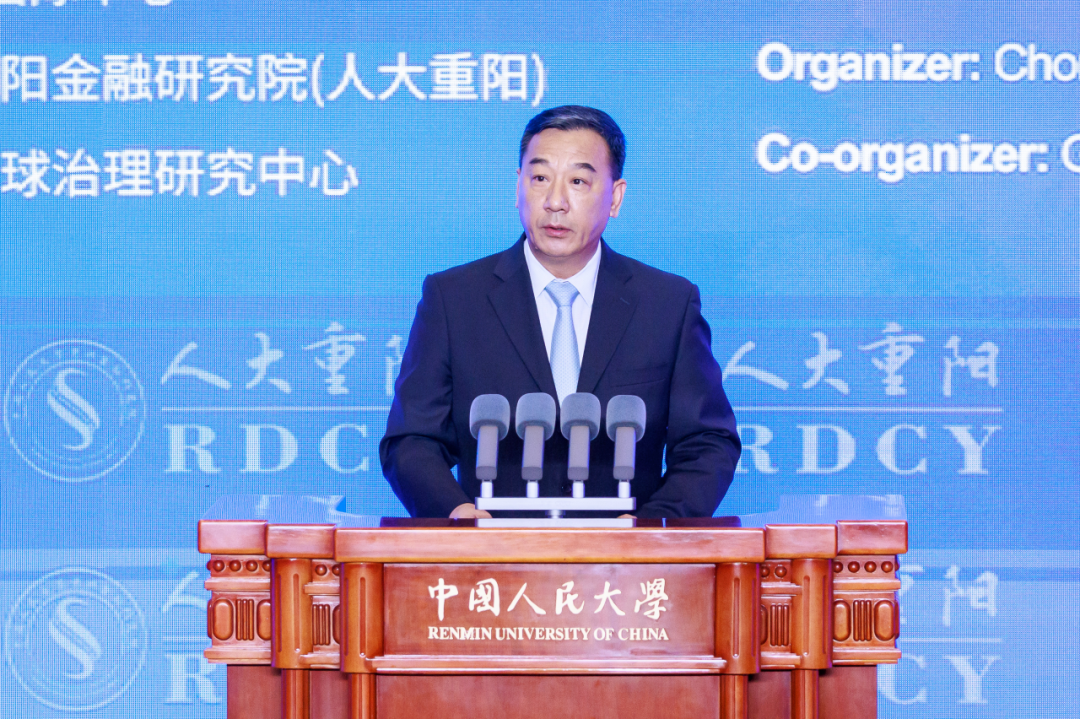
Zhang Donggang, Chairperson of the University Council at RUC and Editor-in-Chief of the Book Series "Ten Years into the Belt and Road Initiative" delivers a speech
Zhang Donggang emphasized that the collaborative endeavor to build the Belt and Road Initiative (BRI) represents a significant proposition set forth by President Xi Jinping in response to the global trajectory of development and the evolving needs of our era. The BRI aims to foster a community of shared future for mankind. While the origins of the BRI can be traced back to China, its scope extends globally, rooted in historical foundations, and oriented toward the future. It offers Chinese wisdom, solutions, and strength to address the unprecedented shifts occurring in our world, within our era, and throughout history.
The publication timing of the book series "Ten Years into the Belt and Road Initiative" just ahead of the Third Belt and Road Forum for International Cooperation, holds special and significant importance. This publication not only fully showcases RUC's continuous and systematic research efforts into the development of the BRI in recent years but also stands as a remarkable tribute to the Third Belt and Road Forum for International Cooperation.
In the coming years, RUC intends to fully utilize its distinctive advantages in the fields of humanities and social sciences. The university will continue to dedicate itself to strengthening theoretical research related to the construction of the Belt and Road Initiative. This includes actively developing the conceptual framework and theoretical system of the initiative. RUC will also persistently work on enhancing the international dissemination of the initiative, promoting a correct understanding and broad acceptance within the international community. Furthermore, RUC will remain committed to enhancing the cultivation of talents for the BRI, providing a solid foundational support for deepening the practical implementation of the initiative.
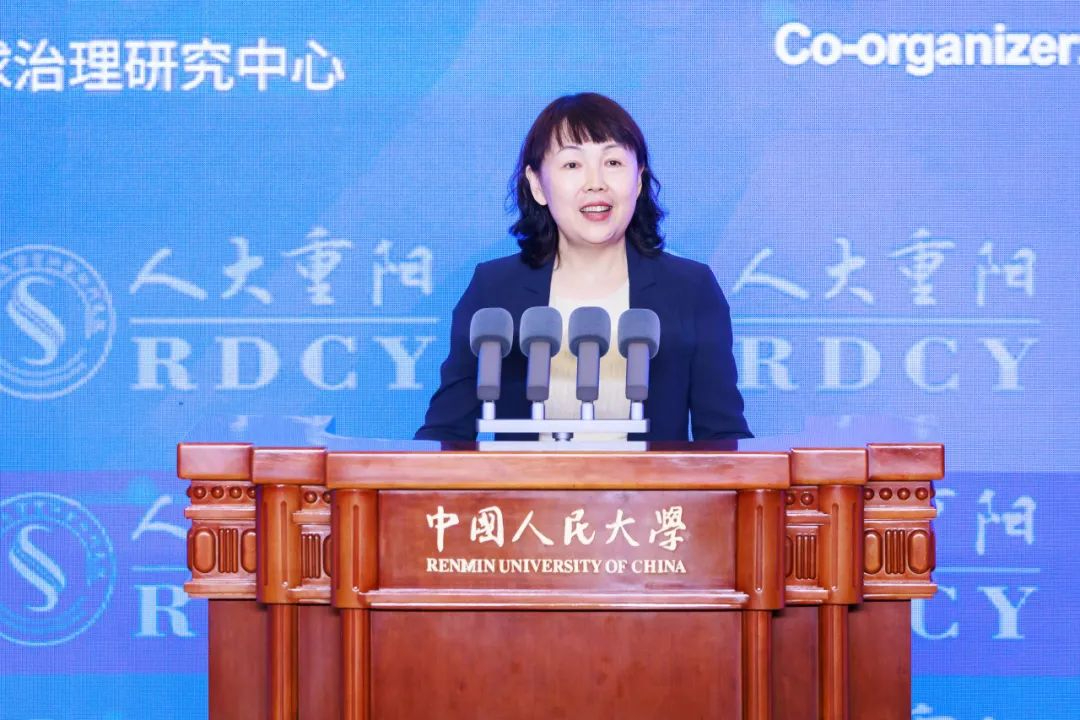
Shi Ling, Vice President of CPIFA, delivers a speech
Representing CPIFA, Shi Ling extended a warm welcome to all the distinguished guests and scholars. She remarked that the thousand-year-old Silk Road has witnessed the history of human civilization interaction and has been revitalized in the new era. A decade ago, during President Xi Jinping's visits to Kazakhstan and Indonesia, he put forth the Belt and Road Initiative, proposing the construction of the New Silk Road Economic Belt and the 21st-Century Maritime Silk Road. Over the past ten years, through collaborative endeavors, the initiative has transformed from a vision into reality. China has signed cooperation agreements with more than 150 countries and over 30 international organizations, resulting in a multitude of cooperative projects taking shape. Guided by the principles of consultation, construction, and shared benefits, the BRI upholds true multilateralism, fully leveraging the strengths and potential of all parties through various forms of cooperation, including bilateral, trilateral, and multilateral approaches.
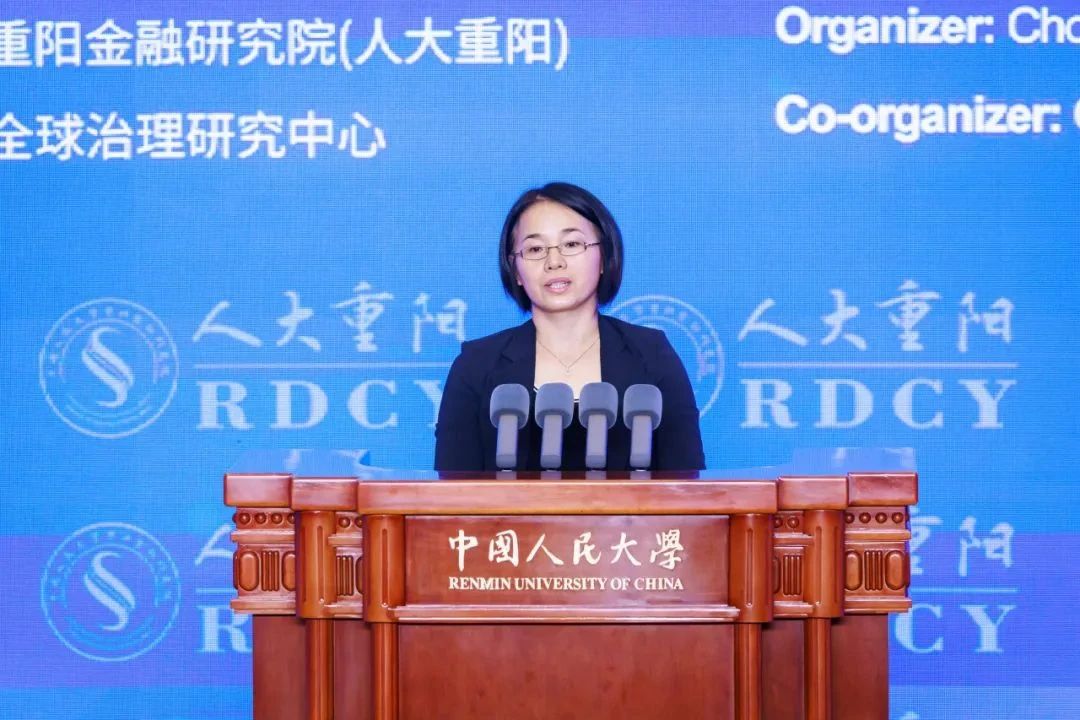
Xu Rong, Editor-in-Chief of FLP, delivers a speech
Xu Rong expressed that after a decade of development, the Belt and Road Initiative has continuously expanded its collaborative regions and domains. With concrete accomplishments in construction, it has dispelled uncertainties and responded to inquiries, emerging as the world's largest international cooperation platform and a widely embraced international public good. RDCY was among the earliest think tanks to engage with BRI. Its extensive research outcomes have effectively addressed various concerns and enhanced the global comprehension of this initiative. Continuing the collaboration that began with the publication of the book series "Belt and Road: Stories" in 2017 and the book series "Five Years of the Belt and Road Initiative" in 2019, RDCY and FLP have once again joined forces. Led by Chairperson Zhang Donggang as the Editor-in-Chief, they have meticulously curated and published the book series "Ten Years into the Belt and Road Initiative." This series comprises eight books published in nine languages. It presents a focused exposition of the accomplishments in BRI's construction over the past decade to the global community. Through this series, the challenges and difficulties the initiative has encountered are authentically depicted.
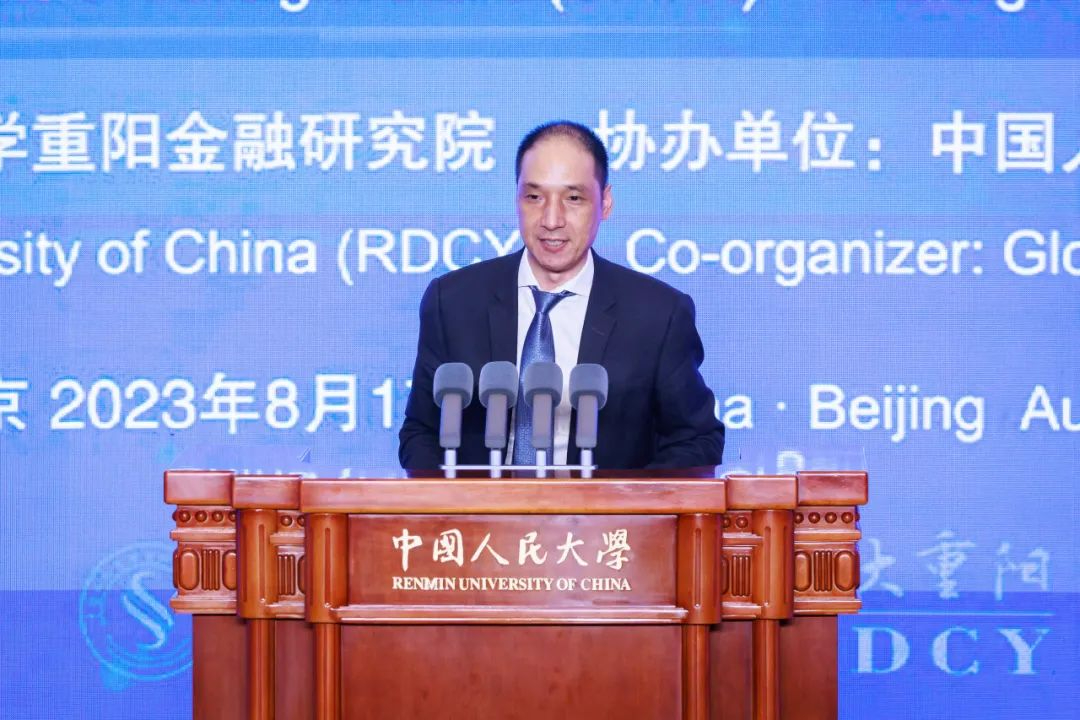
Ye Kangtao, Vice President of RUC, moderates
Ye Kangtao, Vice President of RUC, moderated the opening remark session. He summarized that the upcoming Third Belt and Road Forum for International Cooperation, to be held in October this year, will be China's most significant diplomatic event in 2023, garnering substantial global attention. Prior to the forum, RUC, in collaboration with CPIFA, FLP, and NGIC, has partnered to invite distinguished political figures and experts from both domestic and international spheres to jointly launch the book series "Ten Years into the Belt and Road Initiative" along with its compiled edition, as a tribute to the tenth anniversary of the BRI. He expressed his great pleasure in reuniting with old and new friends at RUC and conveyed warm appreciation to all the attendees for their presence.
During the keynote speech session, Boris Tadic, former President of Serbia, Zlatko Lagumdzija, former Prime Minister of Bosnia and Herzegovina, and Djoomart Otorbaev, former Prime Minister of Kyrgyzstan, delivered keynote speeches.
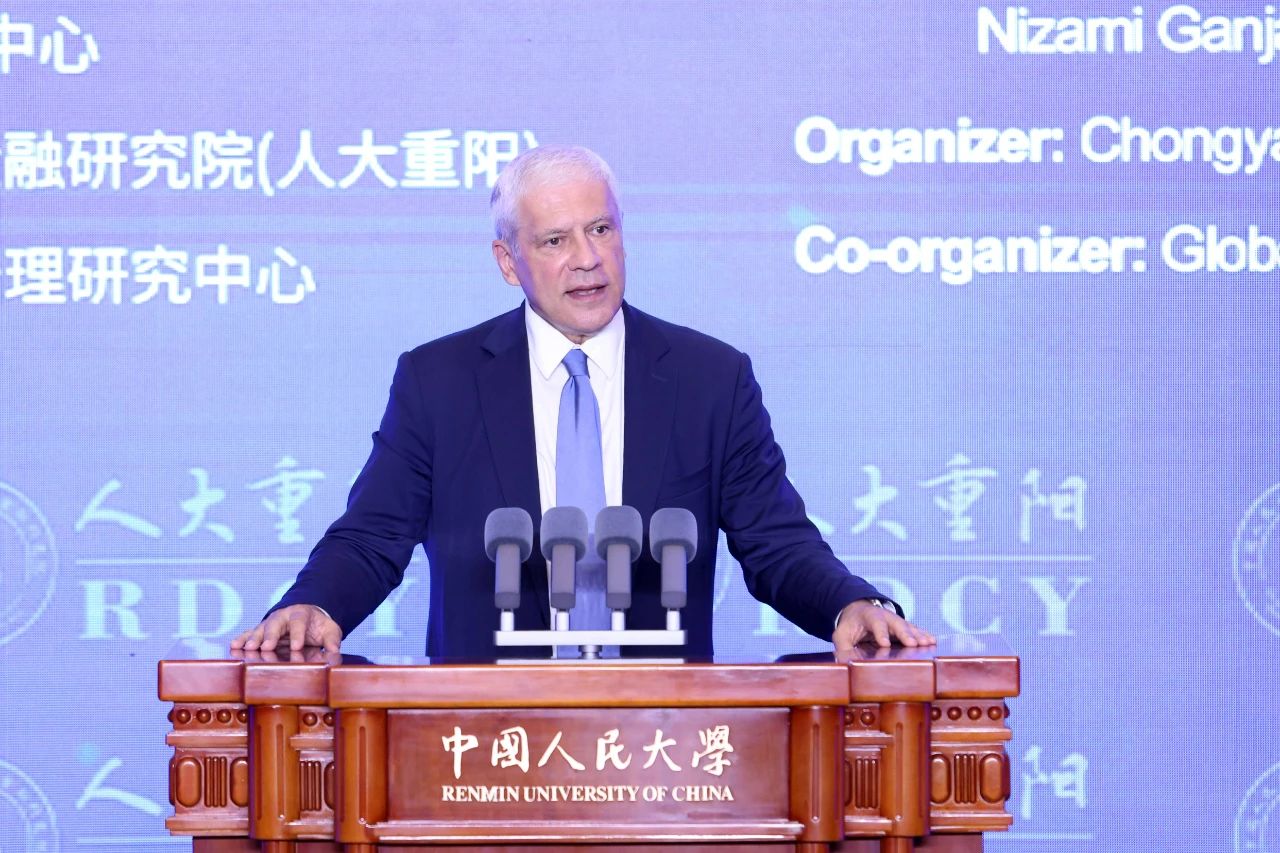
Boris Tadic, Former President of Serbia, delivers keynote speech
Boris Tadic expressed that over the past decade, numerous infrastructure projects have made significant advancements, and China has also facilitated transformative changes in many developing countries. We have witnessed the introduction and development of various peace initiatives during this time. However, during the initial stages of the Belt and Road Initiative, we couldn't have foreseen the profound changes it would bring about and the far-reaching global impact it would have. Meanwhile, the current signs indicate that humanity is facing challenges in its historical developmental process. Just like ten years ago, we couldn't predict the crises and challenges that the world is confronted with today. Tadic believes that as the world changes and policies evolve, these challenges will also change accordingly. The focus of the BRI should be on the present while also looking toward future development. Therefore, anticipating the challenges that are likely to emerge in the future is something we must consider at the current stage of our development.
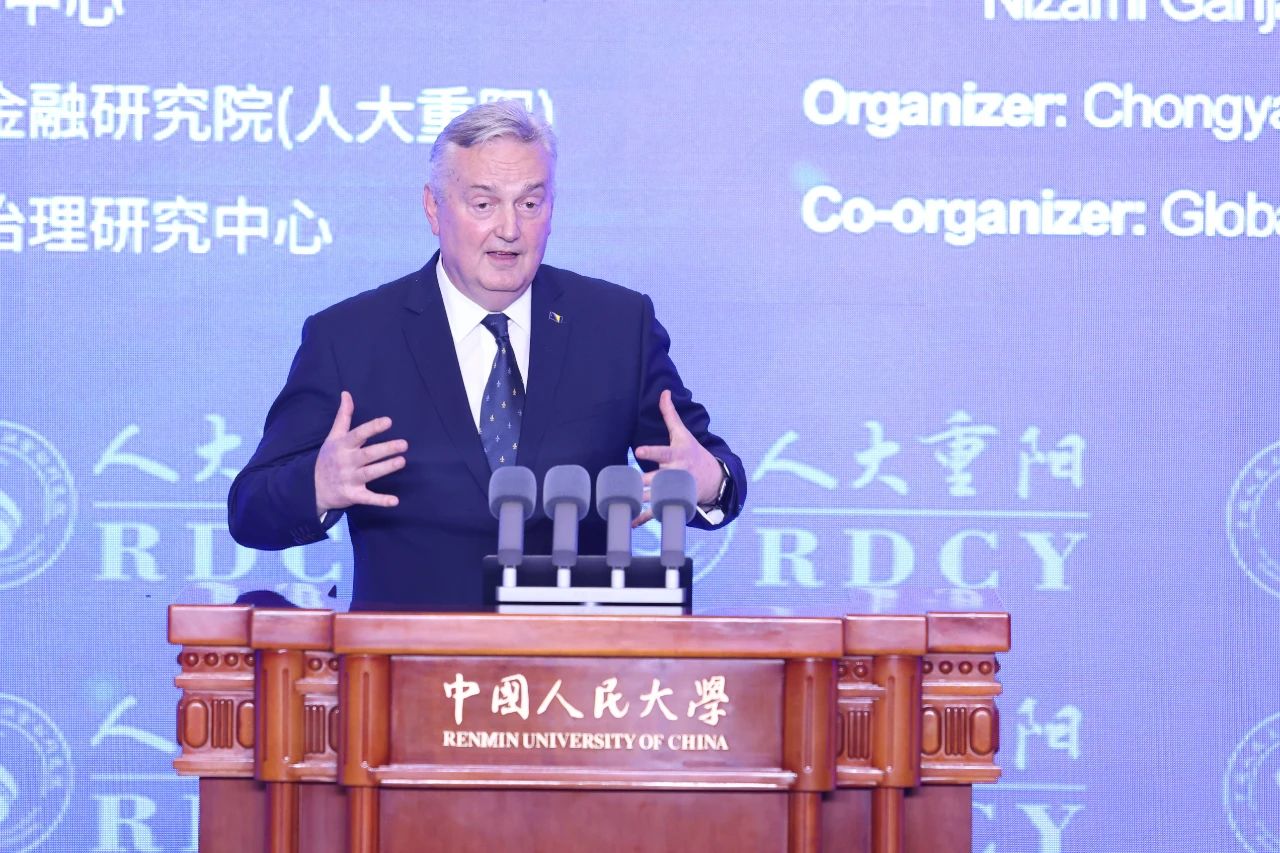
Zlatko Lagumdzija, Former Prime Minister of Bosnia and Herzegovina, delivers keynote speech
Zlatko Lagumdzija believes that today's symposium is timely, as it not only marks the tenth anniversary of the Belt and Road Initiative but also occurs at a time when the world is facing more urgent challenges and seeking solutions within an increasingly intricate context. The BRI has put forth a multitude of feasible measures to navigate this complex landscape and establish a tangible and visible path to follow. This is precisely why the world is in dire need of China today, just as China equally requires the collaboration of other countries. He emphasized that, guided by China's initiative, our focus should be on shared development, better aligning with the United Nations' 2030 Agenda for Sustainable Development. The objective is to construct a harmonious society, foster a positive global atmosphere, and propel collective progress. Despite our differences, the common purpose of cooperative advancement unites us on this shared journey. He urged that everyone come together and develop a future path characterized by peace and shared prosperity.
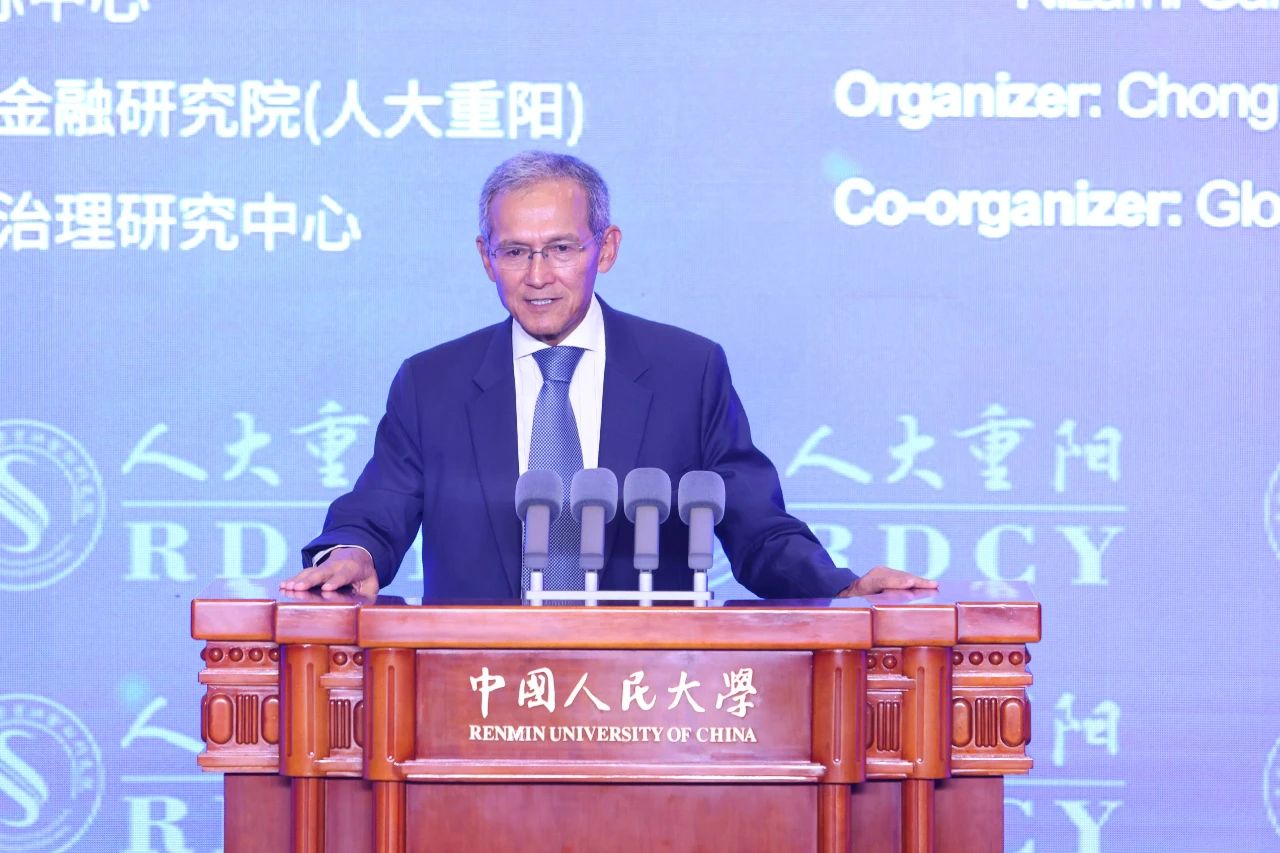
Djoomart Otorbaev, Former Prime Minister of Kyrgyzstan,delivers keynote speech
Djoomart Otorbaev expressed that he had also spoken at RUC in 2019 before the outbreak of the Covid-19 pandemic. He was deeply moved when, after successfully managing the pandemic, China reopened its doors, and these youthful faces were once again before him. He emphasized that the Central Asian countries greatly appreciate the ancient Silk Road. The vast mountains separated Central Asia from East Asia and Europe, but now Central Asia has a new era Silk Road that connects us. The opening of the China-Europe Railway Express also reinvigorates trade. He believes that China will play a very important role for a long time to come. We need to focus on nurturing talent, as talent is crucial. Future leaders will completely change our world, which means RUC should become a leader of this era.
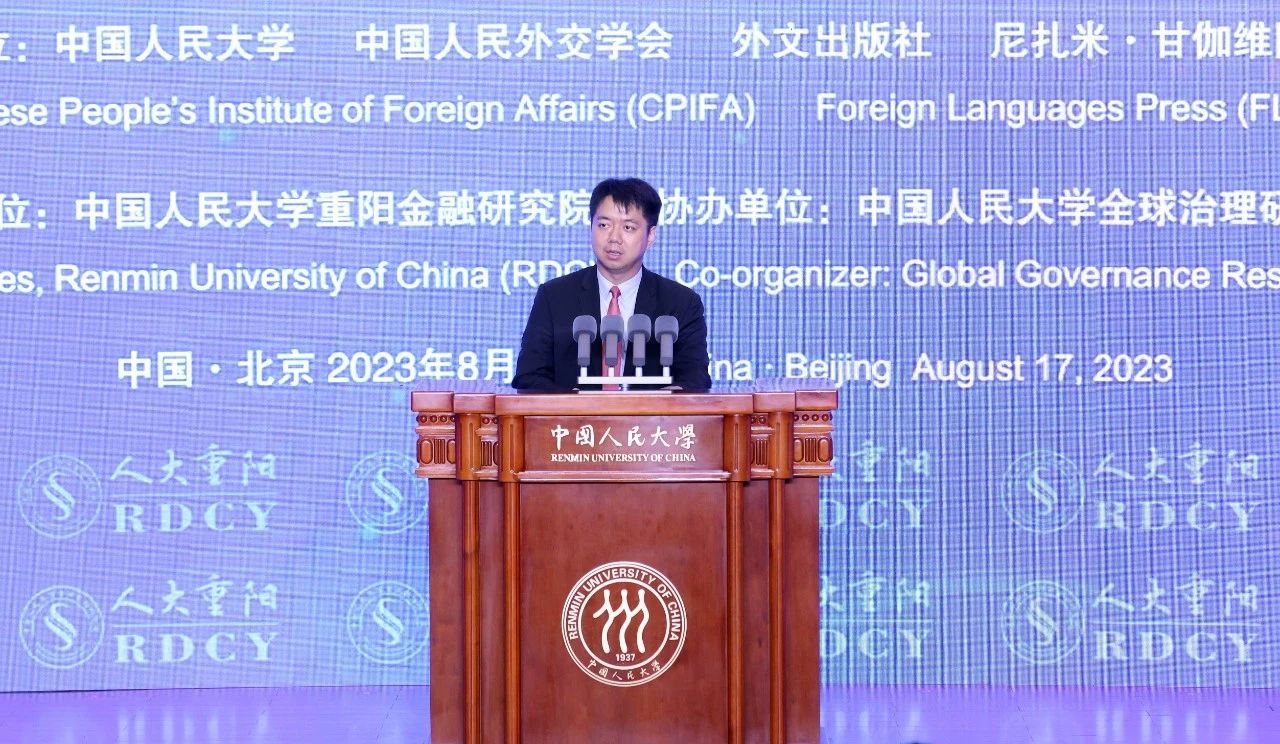
Wang Wen, Executive Dean of RDCY, Vice President of Silk Road School at RUC, and Executive Editor and Co-author of the Book Series "Ten Years into the Belt and Road Initiative", moderates
The keynote speech session was moderated by Wang Wen, Executive Dean of RDCY, Vice President of Silk Road School at RUC, and Executive Editor and co-author of the Book Series "Ten Years into the Belt and Road Initiative." Wang Wen summarized that the promising future prospects discussed by former President Tadic are highly anticipated. As former Prime Minister Lagumdzija also mentioned, a better tomorrow lies ahead. Over the past decade, we have made significant progress step by step. Since the introduction of the Belt and Road Initiative, China's vision for the world's future has become clearer. This process of clarification reflects China's commitment to participating in, and even leading, global governance efforts. It also signifies a more distinct articulation of China's vision for the future.
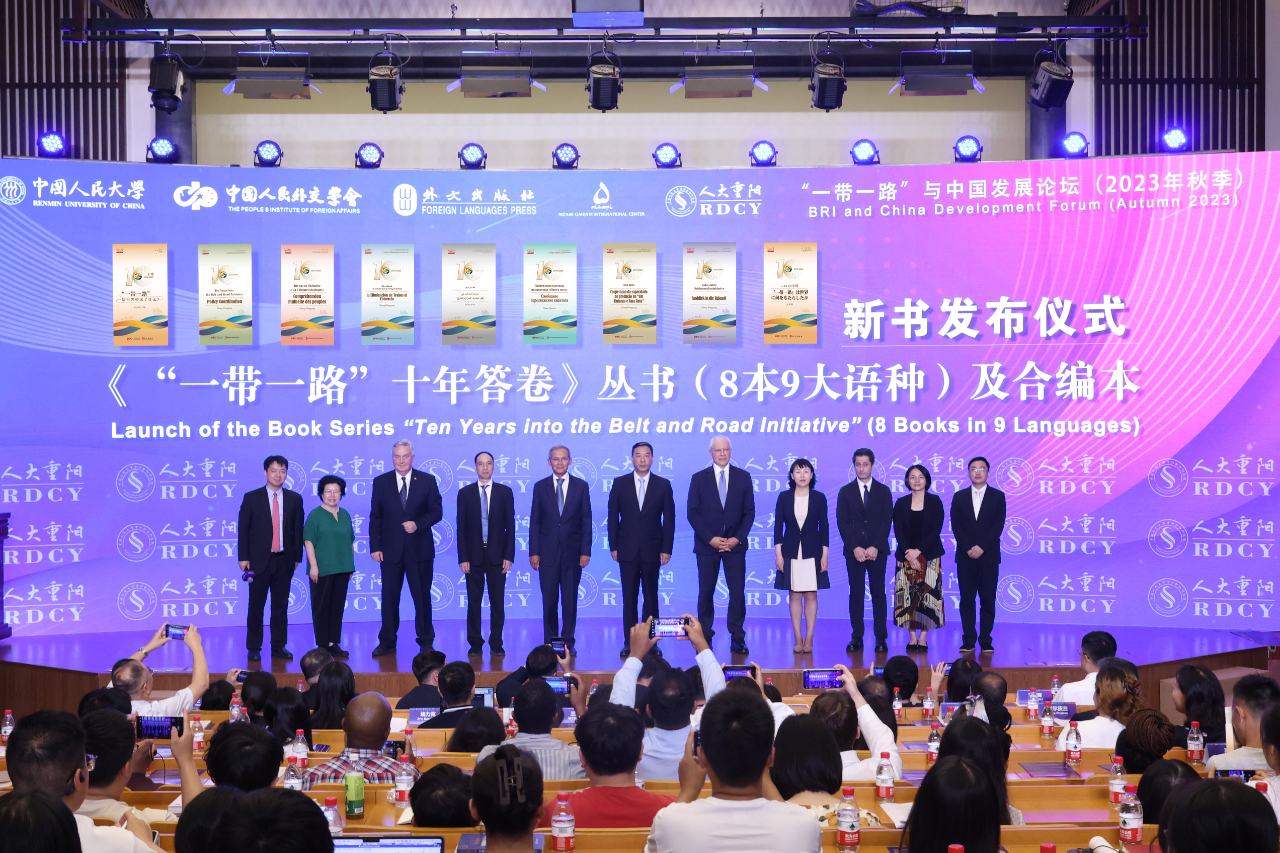
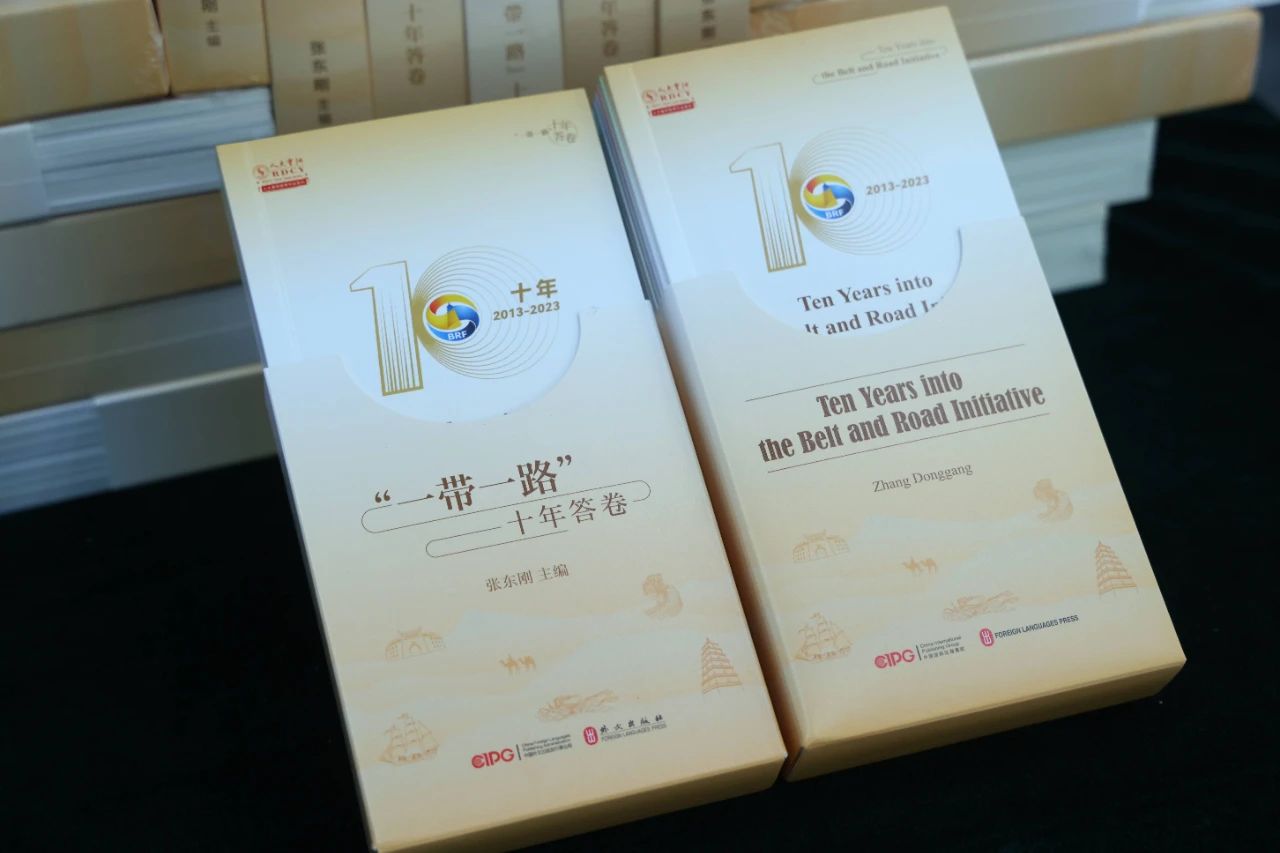
Launch of the Book Series "Ten Years into the Belt and Road Initiative" (8 Books in 9 Languages)
During the book launch session, the book series "Ten Years into the Belt and Road Initiative" (8 books in 9 languages) along with its compiled edition, was officially launched. This series, under the editorial leadership of Zhang Donggang and published by FLP, is a part of the intellectual works collection of RDCY. It encompasses eight individual books that will be translated into nine languages (including Chinese, English, French, Spanish, Arabic, Russian, Portuguese, German, and Japanese) for global distribution. Furthermore, these volumes will be compiled into an edition entitled "Walking Together on the Great Road: Ten Years into the Belt and Road Initiative." This endeavor follows the publication of the book series "Belt and Road: Stories" (7 books in 6 languages) in 2017 and the book series "Five Years of the Belt and Road Initiative" (7 books in 6 languages) in 2019. These two series were presented as reference materials during the preceding two Belt and Road Forums for International Cooperation. The publication of this new series stands as a tribute to the upcoming Third Belt and Road Forum for International Cooperation scheduled for this October.
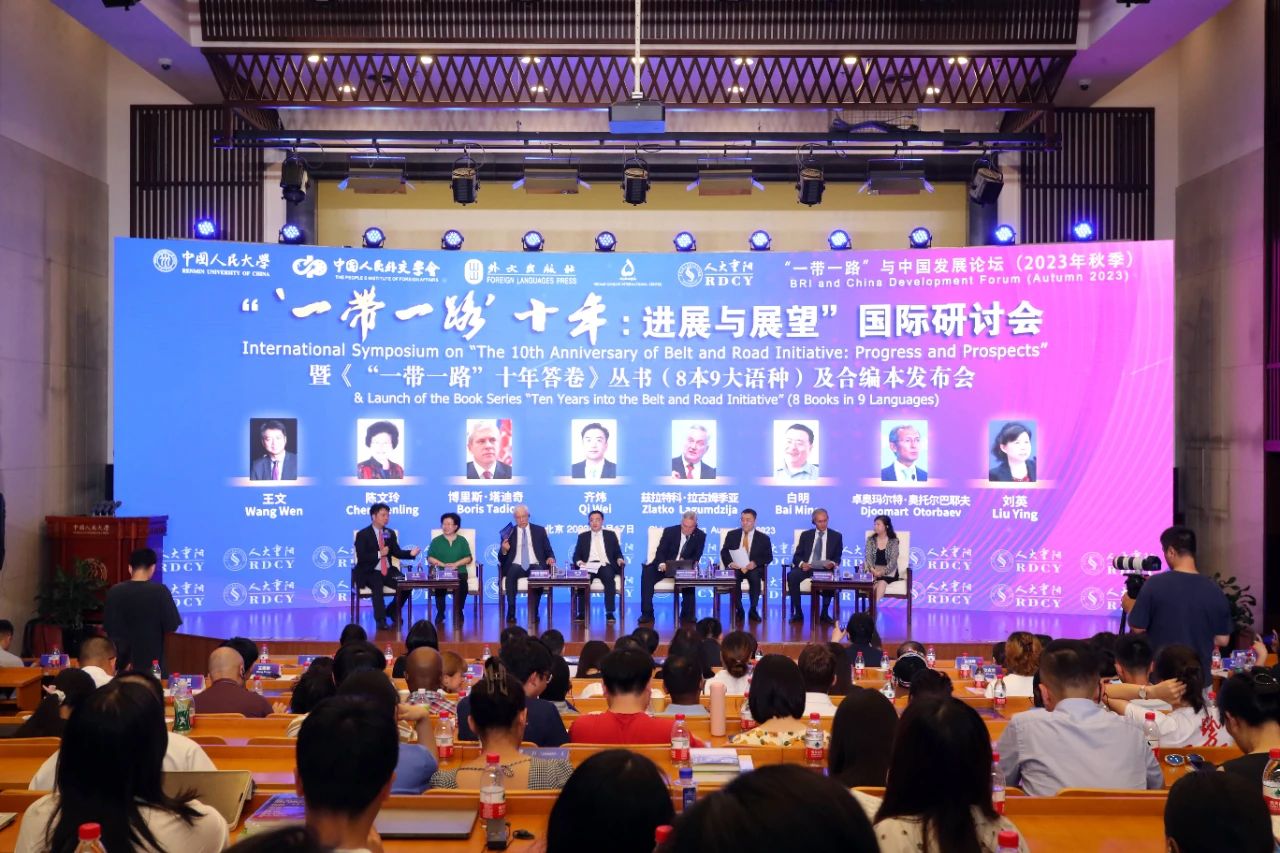
Thematic Speech and Dialogue Session
In the following thematic speech and dialogue session, Chen Wenling, Chief Economist of China Center for International Economic Exchanges; Boris Tadic, former President of Serbia; Qi Wei, Deputy Director of China Center for Contemporary World Studies, International Department of the Central Committee of the Communist Party of China; Zlatko Lagumdzija, former Prime Minister of Bosnia and Herzegovina; Bai Ming, Member of the Academic Degree Committee and Researcher of the Chinese Academy of International Trade and Economic Cooperation; Djoomart Otorbaev, former Prime Minister of Kyrgyzstan; and Liu Ying, Research Fellow of RDCY and Co-author of the Book Series "Ten Years into the Belt and Road Initiative", delivered thematic speeches and engaged in dialogues.
Chen Wenling stressed the importance of upholding high quality and risk management in the construction of the Belt and Road Initiative to ensure its steady and sustainable progress. Building upon the foundation of win-win cooperation, consultation, collaboration, and shared benefits, it is essential to shift away from a singular focus on investing in specific countries, entities, and methods. This shift helps mitigate risks to both businesses and individuals. Additionally, maintaining inclusivity and embracing an open stance towards other global infrastructure projects are vital components of this effort.
Boris Tadic highlighted that connectivity is a fundamental aspect of the Belt and Road Initiative. It signifies enhanced mutual understanding between China and other nations. The problem facing China today is the lack of understanding and knowledge of China in the Western world. This circumstance could persist in the coming decade. Thus, it is imperative for the global community to strengthen communication, particularly for other countries to enhance their understanding of Chinese history.
Qi Wei expressed that the Belt and Road Initiative possesses a natural inner drive that originates from human society, particularly the profound aspirations of the people within the Eurasian continent. Only through connectivity can understanding and trust be fostered, ultimately leading to enduring peace and continuous development. However, the core and central regions of the world island, represented by the Eurasian continent, have long lacked genuine connectivity due to various reasons. Nevertheless, under the guidance and promotion of President Xi Jinping, the Belt and Road Initiative has emerged over the past decade, connecting populations, resources, markets, technologies, and finances throughout the Eurasian continent.
Zlatko Lagumdzija stated that the Belt and Road Initiative is of utmost significance, bringing favorable transformations to countries with low and middle incomes, as it establishes a successful paradigm. The zero-sum game leads to losses on both sides, whereas the win-win cooperative approach is preferable. It is imperative to integrate the BRI with the agenda of sustainable development, while also offering enhanced support for pertinent projects and regional advancement from a global and financial standpoint.
Bai Ming remarked that the Belt and Road Initiative is not a unilateral effort by China, but rather a collective endeavor. More benefits can be reaped through the principles of consultation, construction, and shared benefits. As an illustration, in the initial seven months of 2023, China's total import and export trade grew by a mere 0.4%, whereas trade with countries along the BRI surged by 7.4%. This discrepancy of seven percentage points can largely be attributed to the "acceleration" facilitated by the BRI.
Djoomart Otorbaev stressed that for the Belt and Road Initiative, there might be a need to shift from a focus on quantity to an emphasis on quality, whereby beneficial investments are transformed into credit instruments. What is needed is not assistance, but rather cooperation based on equality and mutual benefit. As a financial studies institution, RDCY can explore ways to enhance the quality and standards of the BRI's development.
Liu Ying presented ten perspectives on the Belt and Road Initiative, including an engine for global economic growth, a transformer of the world's economic geography, a pioneer in creating new economic growth opportunities, and an enhancer of global well-being. Serving as an international cooperation platform, it contributes to global governance solutions, drives global inter-connectivity networks, advances global security and development, and facilitates comprehensive economic globalization.
Wang Wen moderated the thematic speeches and dialogue session. He mentioned that the Belt and Road Initiative is just a decade old, and in many aspects, we need more patience. Whether three former dignitaries offering us suggestions, we should listen attentively. If the BRI were likened to a stock, it would certainly be considered a stock with great potential. Therefore, we need to understand it, engage with it, and, more importantly, reshape it for the future to make it even better. This involves both risk management and a commitment to its high-quality development.























































































 京公网安备 11010802037854号
京公网安备 11010802037854号





